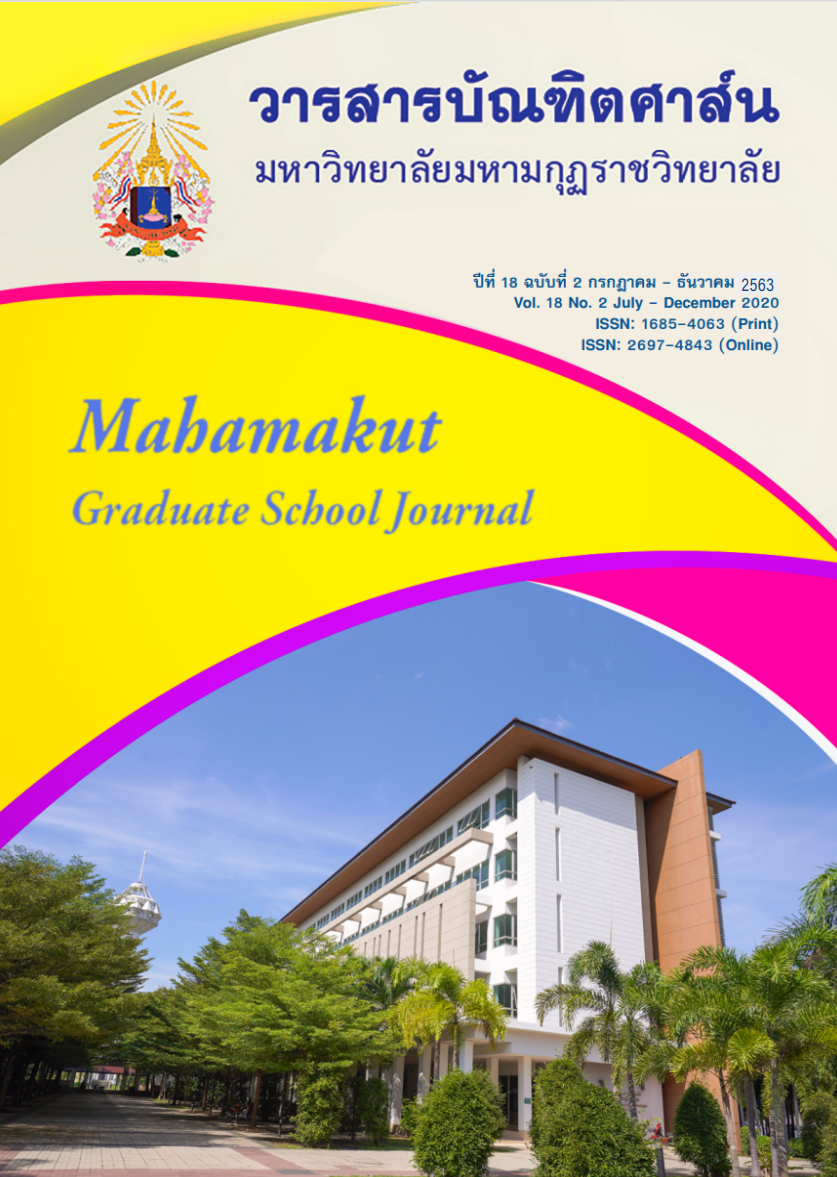ผลของโปรแกรมส่งเสริมการรับรู้สมรรถนะแห่งตนของมารดา ต่อพฤติกรรมการส่งเสริมพัฒนาการเด็ก ช่วงอายุ 0-5 ปี
คำสำคัญ:
การรับรู้สมรรถนะแห่งตน;, การส่งเสริมพัฒนาการ;บทคัดย่อ
การวิจัยกึ่งทดลองนี้ มีวัตถุประสงค์เพื่อศึกษาผลของโปรแกรมส่งเสริมการรับรู้สมรรถนะแห่งตนของมารดาต่อพฤติกรรมการส่งเสริมพัฒนาการเด็ก ช่วงอายุ 0-5 ปี กลุ่มตัวอย่างคือ มารดาที่อาศัยอยู่ใน จังหวัด นครศรีธรรมราช จำนวน 60 คน แบ่งเป็นกลุ่มควบคุม และกลุ่มทดลองกลุ่มละ 30 คน เครื่องมือดำเนินการวิจัย ได้แก่ โปรแกรมส่งเสริมการรับรู้สมรรถนะแห่งตนของมารดาในการส่งเสริมพัฒนาการเด็กช่วงอายุ 0-5 ปี ซึ่งประกอบด้วย 4 วิธีการ ได้แก่ 1) การกระทำที่ประสบความสำเร็จด้วยตนเอง 2) การสังเกตตัวแบบ หรือ การสังเกตประสบการณ์ของผู้อื่น 3) การได้รับคำแนะนำหรือชักจูงด้วยคำพูด 4) สภาวะทางสรีระและอารมณ์
เครื่องมือเก็บรวบรวมข้อมูล ได้แก่ แบบสอบถามข้อมูลส่วนบุคคล แบบสอบถามการรับรู้สมรรถนะแห่งตนในการส่งเสริมพัฒนาการเด็ก และ แบบสอบถามพฤติกรรมของมารดาในการส่งเสริมพัฒนาการเด็ก ซึ่งเครื่องมือที่ใช้เก็บรวบรวมข้อมูลผ่านการตรวจสอบจากผู้ทรงคุณวุฒิ จำนวน 3 ท่านและทดสอบความเที่ยงของแบบสอบถาม ได้ค่าสัมประสิทธิ์แอลฟ่าครอนบาค (Cronbach’s alpha coefficient) เท่ากับ .79 และ .81 ตามลำดับ วิเคราะห์ข้อมูลโดยหาค่าเฉลี่ย ส่วนเบี่ยงเบนมาตรฐาน และการทดสอบที ผลการวิจัย พบว่า
1) คะแนนเฉลี่ยพฤติกรรมการส่งเสริมพัฒนาการเด็กของมารดาหลังเข้าร่วมโปรแกรมส่งเสริมการรับรู้สมรรถนะตนเองต่อการรับรู้สมรรถนะตนเองในกลุ่มทดลองสูงกว่าก่อนเข้าร่วมโปรแกรมอย่างมีนัยสำคัญทางสถิติ (p< .05)
2) คะแนนเฉลี่ยพฤติกรรมการส่งเสริมพัฒนาการเด็กของของมารดาหลังเข้าร่วมโปรแกรมส่งเสริมการรับรู้สมรรถนะตนเองต่อการรับรู้สมรรถนะแห่งตนสูงกว่ากลุ่มที่ได้รับการพยาบาลตามปกติ อย่างมีนัยสำคัญทางสถิติ (p< .05)
งานวิจัยจึงมีข้อเสนอแนะให้เจ้าหน้าที่สาธารณสุขนำโปรแกรมส่งเสริมการรับรู้สมรรถนะแห่งตนไปใช้เพื่อให้มารดามีสมรรถนะในการส่งเสริมพัฒนาการเด็ก อย่างเหมาะสมตามวัย
เอกสารอ้างอิง
สมรรถนะแห่งตนต่อการส่งเสริมพัฒนาการเด็กปฐมวัย. วารสารการพยาบาลและสุขภาพ, 11(3), 92-101.
ปรัชญาพร ธิสาระ, จุฑามาศ ผลมาก, เพชรลดา สีขาว และบุษยารัตน์ ศิลปวิทยาทร. (2560). ปัจจัยทำนาย
พฤติกรรมส่งเสริมเด็กปฐมวัยของผู้ปกครอง ในจังหวัดพะเยา. วารสารพยาบาลและการดูแลสุขภาพ. 35(2),
169-176.
เพ็ญภัทร เล็กพวงทอง. (2561). แบบรายงานการตรวจราชการระดับจังหวัด ปีงบประมาณ พ.ศ. 2561 คณะที่ 1
การส่งเสริมสุขภาพป้องกันโรค และการจัดการสุขภาพ หัวข้อ การพัฒนาสุขภาพ กลุ่มสตรีและเด็กปฐมวัย
(0-5 ปี) จังหวัด อุดรธานี เขตสุขภาพที่ 8 ตรวจราชการวันที่ 4-6 กรกฎาคม 2561.
แพรวดาว พันธุรัตน์, วนิดา เสนะสุทธิพันธุ์ และทัศนี ประสบกิตติคุณ. (2554). ผลของโปรแกรมส่งเสริมความรู้
และการรับรู้สมรรถนะของตนเองต่อการรับรู้สมรรถนะในการดูแลเด็กโรคหัวใจแต่กำเนิดไม่เขียวของผู้ดูแล.
Journal of Nursing Science, 9(4), 46-53.
ภาริดา ตันตระกูล ทัศนี ประสบกิตติคุณ และพรรณรัตน์ แสงเพิ่ม. (2556). ผลของโปรแกรมส่งเสริมการรับรู้
สมรรถนะตนเองต่อการรับรู้สมรรถนะตนเองของมารดาครรภ์แรกในการดูแลทารกเกิดก่อนกำหนด.
วารสารเกื้อการุณย์, 20(1), 42-54.
ยศวีร์ กีรติภควัต (2553). ผลของโปรแกรมส่งเสริมการรับรู้สมรรถนะแห่งตนต่อพฤติกรรมการดูแลของมารดา ใน
การป้องกันการกลับเป็นซ้ำของโรคปอดอักเสบในบุตรปฐมวัย. วารสารพยาบาลศาสตร์และสุขภาพ, 40(2).
วรงรอง นิลเพ็ชร์. (2554). ผลของโปรแกรมการพัฒนาสมรรถนะแห่งตนของผู้ดูแลเด็กต่อพฤติกรรมการส่งเสริม
สุขภาพเด็กวัยหัดเดินในศูนย์พัฒนาเด็กเล็ก. (วิทยานิพนธ์ปริญญามหาบัณฑิต,
มหาวิทยาลัยสงขลานครินทร์).
ศิริพร ชุดเจือจีน, ประไพพิศ สิงหเสม และสุดารัตน์ วุฒิศักดิ์ไพศาล. (2560). ผลของโปรแกรมส่งเสริมการรับรู้
สมรรถนะแห่งตนในการสร้างเสริมทักษะชีวิตต่อพฤติกรรมสุขภาพทางเพศของนักเรียน. วารสารเครือข่าย
วิทยาลัยพยาบาลและการสาธารณสุขภาคใต้, 4(2), 268-280.
สถาบันพัฒนาอนามัยเด็กแห่งชาติ กรมอนามัย. (2563). ข้อมูลเด็กอายุ 0-5 ปี ทั้งหมดตามช่วงอายุที่กำหนด มี
พัฒนาการสมวัย ปี 2563 ไตรมาส 2. (เว็บบล็อค). สืบค้นจาก http://healthkpi.moph.go.th/kpi2/kpi-
list/view/?id=1384 เมื่อ 10 เมษายน 2563
สุกัญญา ฆารสินธุ์. (2555). รูปแบบการเลี้ยงดูเด็กอายุตํ่ากว่า 5 ปีของปู่/ย่า/ตา/ยายที่บริโภคสุราและไม่บริโภค
สุราในอำเภอแห่งหนึ่งจังหวัดขอนแก่น. (วิทยานิพนธ์ปริญญามหาบัณฑิต, มหาวิทยาลัยขอนแก่น).
สำนักส่งเสริมสุขภาพ. (2554). รายงานการสำรวจพัฒนาการเด็ก ปฐมวัยประจำปี 2553. กรุงเทพมหานคร: ชุมนุม
สหกรณ์ การเกษตรแห่งประเทศไทย.
หนึ่งฤทัย เกื้อเอียด ปุญญพัฒน์ ไชยเมล์ และ สมเกียรติยศ วรเดช. (2561). สถานการณ์และปัจจัยที่มี
ความสัมพันธ์ต่อพัฒนาการของเด็กไทยอายุต่ำกว่า 5 ปี: การทบทวนวรรณกรรม. วารสารเครือข่ายวิทยาลัย
พยาบาลและการสาธารณสุขภาคใต้, 5(1), 281-596.
วารสารวิทยาลัยพยาบาลบรมราชชนนี กรุงเทพ, (34)3, 1-10.
อุรารักษ์ ลำน้อย และนรลักขณ์ เอื้อกิจ. (2552). ผลของการใช้โปรแกรมส่งเสริมการรับรู้สมรรถนะแห่งตนต่อ
พฤติกรรมการจัดการตนเองของผู้ป่วยเด็กวัยเรียนโรคหอบหืด. กุมารเวชสาร, 16(2).
อัจฉราพร ปิติพัฒน์ สิริณัฏฐ์ โภคพัชญ์ภูเบศ ชลินดา คำศรีพล สมสมร เรืองวรบูรณ์. (2561). ปัจจัย
ที่มีความสัมพันธ์ต่อพฤติกรรมการส่งเสริมการเจริญเติบโตและพัฒนาการของผู้ดูแลเด็กวัยเตาะแตะ.
Bandura, A. (1997). Self- efficacy: The exercise of control. New Jersey: W.H. Freeman
Khorngsanor, S. (2016). Early Childhood Education :The key of education. [on line].
Cite in : August 7, 2017, from
http://www.parliament.go.th/ewtadmin/ewt/parliament_parcy/ewt_dl
Jampaklay, A. (2013). Children Living Apart from Parents due to Internal Migration : CLAIM.
1st ed. Institute for Population and Social Research:Mahidol University. (in Thai)
Kalish , H.I. (1981). From behavioral science to behavioral modification. New York:
McGraw-Hill Co.
Polit, D.F., & Beck, C.T. (2004). Nursing research:Principles and methods. Philadelphia:Lippincott
Williams and Wilkins.
World Health Organization. (2012). Developmental difficulties in early childhood: prevention,
early identification, assessment and intervention in low- and middle-income countries: a
review. Child and adolescent health and development. Turkey: Turkey Country Office and
CEECIS Regional Office;. link.php?nid=3 (in Thai).
ดาวน์โหลด
เผยแพร่แล้ว
รูปแบบการอ้างอิง
ฉบับ
ประเภทบทความ
สัญญาอนุญาต
บทความวิชาการและบทความวิจัยในวารสารฉบับนี้ถือเป็นความรับผิดชอบของผู้เขียนเท่านั้น บทความที่ได้รับการตีพิมพ์ในวารสารบัณฑิตศาส์น ถือเป็นลิขสิทธิ์ของมหาวิทยาลัยมหามกุฏราชวิทยาลัย ตามพระราชบัญญัติลิขสิทธิ์



